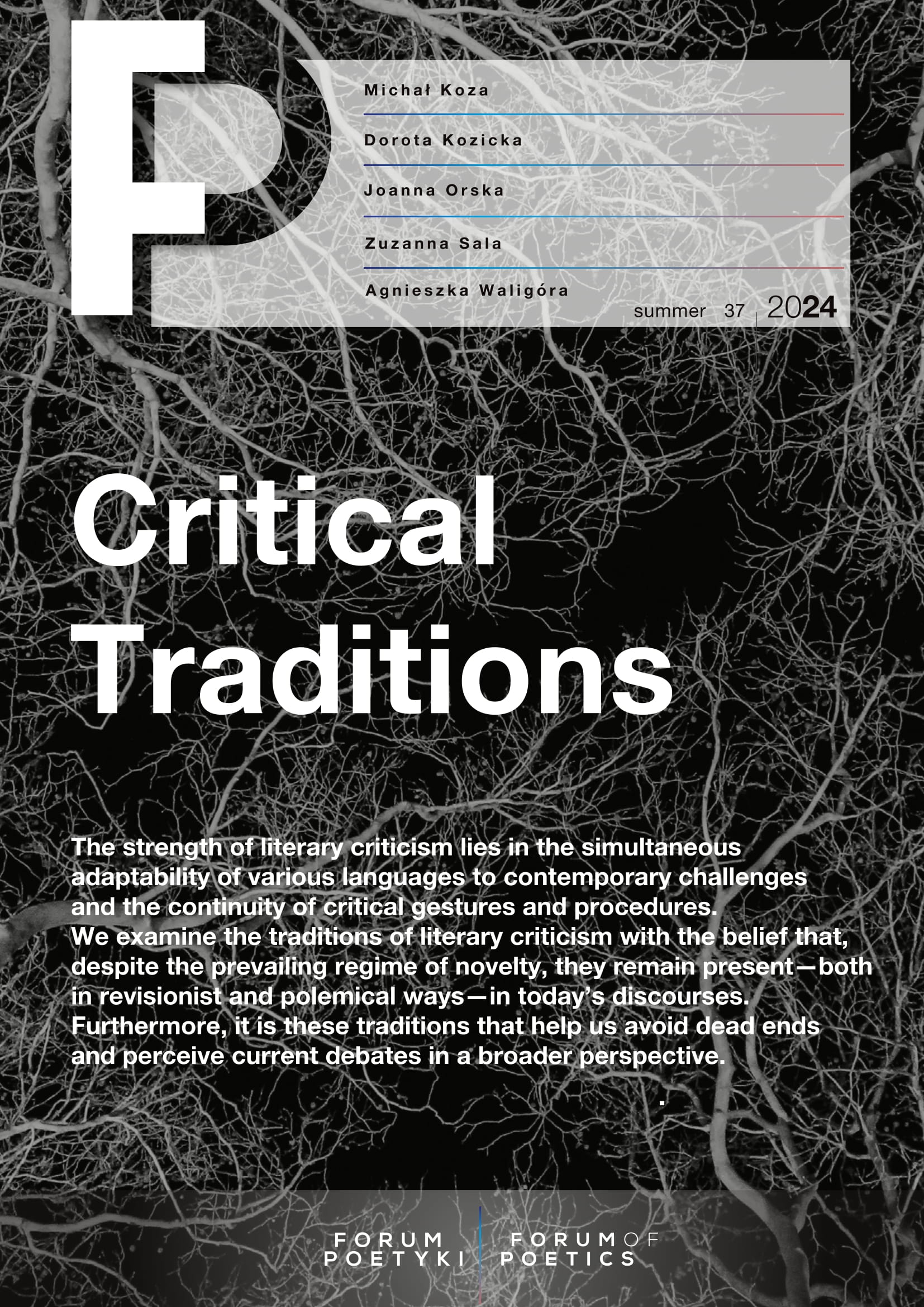The functioning of literary criticism in Poland after 1989 has been shaped by numerous parallel phenomena, including: openness to new modes of reading, influenced by cultural theories adopted at the time; a turn towards anti-academic and private reading approaches; market entanglements that led to journalistic rather than strictly literary-critical styles and genres of writing about literature; the emergence of new communication circuits rooted in innovative media forms, such as literary blogs and social media; and a crisis of literacy. These and other changes have prompted, and at times continue to prompt, assertions about a wholly new situation for literature and criticism after 1989, supposedly marked by a complete rupture with the “Old Masters” and with the critical discourses of previous decades.
In this issue of Forum of Poetics devoted to critical traditions, we propose revisiting these questions from the perspective of (potential) historical continuity – not for archival purposes but in order to seek potential connections that actualize tradition in the contemporary moment. We believe that the strength of literary criticism lies in the simultaneous fluidity of its languages, which adapt to the challenges of the present, and in the durability of critical gestures and procedures. Despite the dominance of novelty and innovation, the problems and questions that arise during disputes and discussions invite us to consider them in a broader temporal perspective.
From the perspective of critical traditions, it seems equally inspiring to trace the ways in which literariness is understood; the historically conditioned expectations of literature and the preferred modes of reading it; the institutions and contexts that stimulate debate around literature; and the influence exerted by critical authorities or personalities, who not only inspired their contemporaries but also left a lasting legacy. That is why we are interested in the many different understandings of tradition: the presence or rejection of authorities (as discussed by Dorota Kozicka, Joanna Orska, Adam Partyka); the revision or renewal of intellectual currents (Michał Koza, Katarzyna Trzeciak, Monika Świerkosz); the extent to which new critical languages are rooted in long-standing disputes about literariness (Paweł Kaczmarski, Zuzanna Sala); and the ideological shifts and intellectual contexts underlying the displacement of specific critical traditions (Agnieszka Waligóra, Łukasz Żurek). The authors of the individual articles examine various traditions present in contemporary critical discourses – those wanted or unwanted, embraced or concealed, and those invoked polemically. They trace the transfers and flows of inspirations that occur between humanistic theories and the practice of literary criticism, rediscovering “old” disputes over the criteria for evaluating works in new conditions and contexts.
It is worth emphasizing at the outset that this issue of Forum of Poetics is in fact an invitation to metacritical debates, with the included articles posing questions rather than offering definitive answers. This stems from our conviction that the essence of research on criticism lies not in summaries or hasty syntheses but in nuancing individual critical positions and uncovering the complex mechanisms which governed critical programs and debates. Only by retrospectively and panoramically examining literary criticism can we avoid dead ends and cyclical reappearance of the same (albeit re-clothed) issues in the practice of literary criticism. Critical traditions– including those revised or serving as polemical reference points– remain fundamental tools for addressing the challenges that manifest in contemporary literary life. Meta-criticism, for its part, enables both an in-depth understanding of the theory and history of literary criticism and literature and a forward-looking engagement with the dynamic space of current debates about literary criticism, shaping them and perhaps even modeling their future course.
Table of Contents:
Paweł Kaczmarski, Traditions of autonomy. Notes for a comparison
Dorota Kozicka, Three Mr. Bs… Desired and Undesired Traditions in Contemporary Criticism
Adam Partyka, The returns of Henryk Bereza
Michał Koza, Mambo Spinoza. The wanted and unwanted traditions of affective criticism
Zuzanna Sala, Literariness against the culture of autobiography






